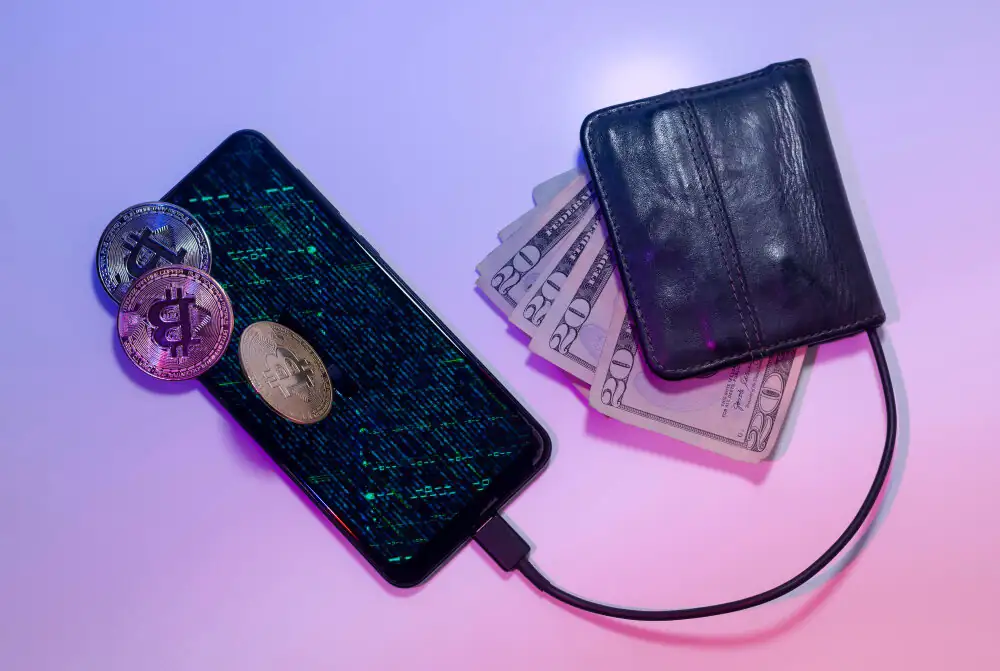Introduction to Cold Wallet Crypto
The need for secure storage solutions has become paramount with the increasing popularity and adoption of cryptocurrencies like Bitcoin, Ethereum, and others. Traditional methods of holding assets, such as bank accounts or physical cash, don't apply to digital currencies. We will introduce you to the concept of cold wallet crypto and explain why it's crucial for safeguarding your valuable crypto assets.
Understanding the Role of Wallets in Cryptocurrency Security
In cryptocurrencies, wallets are pivotal in storing, managing, and accessing your digital assets. A wallet is a software or hardware-based tool that allows you to securely store your private keys, essential for authorizing transfers and accessing funds. At PlasBit, we provide efficient services for Web3 users: With our wallet and Visa cards, you can enjoy your crypto experience knowing that your assets are securely deposited in cold storage wallets. We'll delve into the importance of wallets in maintaining the security of your cryptocurrencies and discuss the critical differences between hot wallets and cold wallets.
Exploring Cold Wallets: A Fortress for Your Crypto Assets
Cold wallets are widely regarded as one of the most secure cryptocurrency storage methods. Unlike hot wallets connected to the internet and susceptible to online threats, cold wallet crypto keeps your private keys offline, significantly reducing the risk of unauthorized access or hacking attempts. We will also explore the different types of cold wallets, including hardware, paper, and software wallets, and highlights their unique features and benefits.
Benefits of Cold Wallets for Beginners in the Crypto Space
Suppose you're new to the world of cryptocurrencies. In that case, cold wallets offer numerous advantages to help you confidently navigate the complex landscape. We'll discuss these benefits in detail, such as enhanced security, peace of mind, and protection against cyber threats. By using a cold wallet, beginners can have greater control over their funds and minimize the risks associated with online wallets or exchanges.
Mitigating the Risks of Hacks and Theft
The cryptocurrency ecosystem is not without its risks. Hacks, scams, and thefts are prevalent, making it crucial to adopt robust security measures. Cold wallets provide an added layer of protection, making it significantly more challenging for hackers to gain unauthorized access to your funds. We'll examine cold wallets' security features and practices to mitigate these risks, ensuring your cryptocurrencies remain safe and secure.
As we continue our journey into cold wallet crypto, we will delve deeper into the different types of cold wallets available, the setup process, and best practices for their usage. Stay tuned for an informative exploration of cold wallets and their role in securely revolutionizing how we store and manage cryptocurrencies.
What Is a Cold Wallet Crypto
Cold wallet refers to storing cryptocurrencies in offline wallets that are not connected to the internet. Unlike hot wallets, which are online and accessible through various devices, cold wallets provide an extra layer of security by keeping private keys offline. It offers a secure way to store and protect digital assets by isolating private keys from potential online threats.
The Advantages of Cold Wallet Crypto
Cold wallet crypto offers several advantages, especially for beginners in the crypto world. Firstly, it provides enhanced security against hacking and malware attacks since the private keys are stored offline. This reduces the risk of unauthorized access to your cryptocurrencies. Additionally, it gives you complete control over your funds, allowing you to be the sole custodian of your private keys. This control is essential for ensuring the safety and privacy of your digital assets.
Types of Cold Wallets
Different cold wallets are available, each with its characteristics and security features. Hardware wallets are physical devices that store private keys and require a physical connection to your computer or mobile device for transactions. Paper wallets involve printing private keys on paper, providing an offline storage option. Software or desktop or mobile wallets are installed on your device, allowing you to manage your cryptocurrencies offline. Each type of cold wallet has pros and cons, and choosing the one that best suits your needs and security preferences is essential.
Using Cold Wallets for Secure Crypto Storage
With a cold wallet crypto, you can securely store various cryptocurrencies, including Bitcoin, Ethereum, etc. When setting up a cold wallet, you will generate a unique address and corresponding private keys. These private keys should be kept in a secure location, such as a safe or lockbox, to prevent unauthorized access. By storing your cryptocurrencies in a cold wallet, you significantly reduce the risk of online attacks and hacking attempts, providing peace of mind regarding the safety of your digital assets.
Balancing Security and Convenience
While cold wallet crypto offers enhanced security, it's essential to consider the balance between safety and convenience. Cold wallets provide high security, but accessing your funds for transactions may require additional steps compared to hot wallets. However, the extra effort is worthwhile for cold wallets' added protection. Understanding the trade-offs between security and convenience allows you to make informed decisions about the best way to manage your cryptocurrencies.
We will explore the step-by-step process of setting up and using a cold wallet, as well as additional security measures and best practices to ensure the safety of your digital assets. That's why, at PlasBit, we provide an educational Blog where you can learn more about Web3 and security measures.

Exploring Secure Crypto Management Solutions
As the popularity of cryptocurrencies continues to grow, so does the need for security solutions to manage these digital assets. Secure crypto asset management is essential to protect your funds from unauthorized access and potential cyber threats.
Cold Wallets: A Foundation of Secure Crypto Asset Management
One of the most effective ways to ensure the security of your cryptocurrencies is through cold wallets. Cold wallets like Ledger Nano S Plus and Ledger Nano X store your private keys offline, away from potential online vulnerabilities. Keeping your private keys offline reduces the risk of unauthorized access and hacking attempts. Cold wallets provide a solid foundation for secure crypto asset management, giving you control over your funds and peace of mind.
Multi-Factor Authentication and Encryption
In addition to cold wallets, implementing multi-factor authentication (MFA) and encryption adds more security to your crypto asset management practices. MFA requires users to provide multiple forms of identification, such as a password and a unique code generated by an authentication app, to access their crypto accounts. Encryption, however, scrambles data to make it unreadable to unauthorized individuals.
Choosing the Right Crypto Management Solution for You
Selecting the right crypto management solution depends on your specific needs and preferences. Factors to consider include:
- The level of security provided
- Ease of use
- Compatibility with your preferred cryptocurrencies
- Any additional features offered
You can find a secure crypto management platform that aligns with your requirements by carefully evaluating different solutions, including our platform. We will further explore the features and functionalities of different secure crypto management solutions, including tips for securing crypto assets and navigating the ever-changing landscape of cryptocurrencies. By equipping yourself with the knowledge and tools for secure crypto management, you can confidently engage in cryptocurrencies while protecting your valuable digital assets.
Best Practices for Safely Holding and Managing Cryptocurrencies
In the world of cryptocurrencies, security is of paramount importance. As a beginner venturing into the crypto space, it's crucial to understand the best practices for safely holding and managing your digital assets. By implementing robust security measures, you can protect your cryptocurrencies from unauthorized access and potential cyber threats.
The Benefits of Cold Wallets for Beginners
Cold wallet crypto offers beginners a secure and reliable option for storing cryptocurrencies. Cold wallets, such as hardware or paper wallets, store your private keys offline, minimizing the risk of online attacks and hacking attempts. By keeping your private keys offline, you retain complete control over your digital assets and reduce the vulnerability associated with online storage. Cold wallets provide a solid foundation for beginners to hold their cryptocurrencies securely.
Best Practices for Safely Holding and Managing Cryptocurrencies
When safely holding and managing cryptocurrencies, several best practices exist. Firstly, create strong, unique passwords for all your crypto-related accounts. Implement two-factor authentication (2FA) to add an extra layer of security. Regularly update your wallet software and operating system to protect against potential vulnerabilities. It's also essential to back up your wallet and private keys in multiple secure locations. Finally, be cautious of phishing attempts and only transact on trusted platforms with a strong track record.
Understanding the best practices for securely storing and managing digital assets is crucial for beginners entering the world of cryptocurrencies. Implementing robust security measures can protect cryptocurrencies from unauthorized access and potential cyber threats. We have explored vital security practices without directly referencing any specific platform.
Cold wallet crypto offers beginners a secure and reliable cryptocurrency storage option, like hardware or paper wallets. Cold wallets minimize the risk of online attacks and hacking attempts by keeping private keys offline. This offline storage approach ensures total control over digital assets and reduces vulnerabilities associated with online storage. Cold wallets are a solid foundation for beginners seeking to hold their cryptocurrencies securely.
Safeguard Your Crypto: Cold Wallets for Ultimate Digital Asset Protection
Different cold wallets exist, each with unique features and security characteristics. Hardware wallets are physical devices that store private keys offline, requiring a physical connection to conduct transactions. Paper wallets involve printing private keys and storing them securely away from the internet. Software or desktop or mobile wallets provide offline device storage options. It is essential to research and choose the type of cold wallet that aligns with your security needs and preferences as a beginner.
Adhering to best practices for safely holding and managing cryptocurrencies is vital. It is crucial to create strong, unique passwords for all crypto-related accounts and implement two-factor authentication (2FA) for an additional layer of security. Regularly updating wallet software and operating systems protect against potential vulnerabilities. Additionally, backing up wallets and private keys in multiple secure locations is essential. Lastly, exercising caution regarding phishing attempts and transacting only on trusted platforms with a solid track record is crucial.
In conclusion, prioritizing security in the management of cryptocurrencies is paramount. As a beginner, consider utilizing cold wallets and following best practices to safeguard your digital assets. By understanding different types of cold wallets and implementing strong security measures, you can confidently navigate the crypto world while ensuring the safety of your cryptocurrencies.







